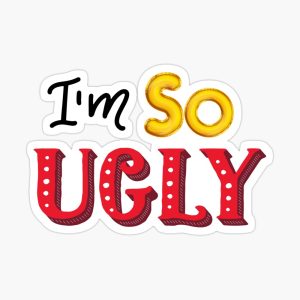Many people ask themselves, “Why am I so ugly?” when they compare their looks to social media influencers, celebrities, or even their peers.Feeling unattractive is a common struggle, especially in a world where beauty standards are constantly changing.
This self-doubt can lead to low self-esteem, anxiety, and self-criticism. However, beauty is subjective, and true attractiveness is more than just physical features. It’s about confidence, self-acceptance, and how you carry yourself. Understanding why you feel this way and learning how to challenge negative thoughts can help you build self-love and inner confidence. In this article, we will explore the reasons behind these feelings, how society and social media influence beauty perceptions, and ways to develop a healthier self-image.
What Does “Why Am I So Ugly?” Mean?
The phrase “Why am I so ugly?” is often an expression of self-doubt and insecurity rather than an objective reality. Many people feel this way when they experience low self-esteem, compare themselves to unrealistic beauty standards, or receive negative comments about their appearance. However, beauty is highly subjective, and what one person finds unattractive, another might find beautiful.

The real issue often lies in how we perceive ourselves rather than how we actually look. This phrase is a cry for validation, self-acceptance, and reassurance that one’s looks are good enough. Instead of focusing on flaws, shifting towards self-improvement and self-love can help combat these feelings. Learning about different beauty perspectives and challenging negative self-talk is key to feeling better about yourself.
Common Reasons People Feel Ugly
Many factors contribute to the feeling of being “ugly,” and they are often psychological rather than physical. Unrealistic Beauty Standards promoted by the media create filtered, edited, and enhanced images, making natural beauty seem inferior. Negative Self-Talk leads to constant self-criticism, reinforcing low self-esteem. Past Experiences such as bullying, teasing, or rejections can create lasting insecurities.
Comparison to Others, especially celebrities and influencers, can lower confidence. Lack of Self-Care like poor grooming, unhealthy habits, or neglecting personal well-being can also affect self-image. Mental Health Issues such as body dysmorphic disorder (BDD) or depression can distort self-perception. Understanding these causes can help shift your mindset and encourage self-acceptance.
The Role of Social Media in Beauty Perception
Social media has redefined beauty standards, often making people feel inadequate about their natural appearance. Filters and Editing make influencers and celebrities look perfect, creating an unrealistic standard. Comparison Culture on social media leads to negative self-perception when people compare their looks to others.
Validation Through Likes makes people seek approval for their appearance, leading to self-doubt. Influencer Beauty Trends promote unrealistic beauty ideals, making those who don’t fit them feel unattractive. To protect your self-esteem, it’s important to limit social media exposure, follow body-positive creators, and remind yourself that perfection online is an illusion.
How Society Shapes Beauty Standards
Society has long dictated what is considered attractive, but these standards constantly evolve. Cultural Differences show that beauty ideals vary worldwide, proving that there is no universal definition of beauty. Media Influence in movies, advertisements, and fashion promotes specific body types, skin tones, and facial features as desirable.
Historical Beauty Trends prove that beauty standards change over time, from curvy figures in the Renaissance era to today’s preference for slim waists and plump lips. Gender Expectations also create pressure, with women expected to look youthful and thin, while men are encouraged to appear muscular and strong. Recognizing that beauty is a social construct can help you detach from unrealistic expectations and embrace your natural look.
The Psychological Effects of Feeling Ugly

Thinking you are ugly can affect mental health and daily life in profound ways. Low Self-Esteem makes people doubt their worth and abilities. Social Anxiety causes individuals to avoid social gatherings out of fear of judgment.
Depression arises from persistent negative thoughts about appearance, leading to deep sadness and hopelessness. Body Dysmorphic Disorder (BDD) is a mental condition where individuals obsess over minor or imagined flaws in their appearance. Seeking therapy, self-help resources, and support groups can be helpful in overcoming negative self-image.
Ways to Overcome Negative Self-Image
Changing how you see yourself takes time, but small steps can make a big difference. Practice Self-Compassion by treating yourself with kindness and patience rather than criticism.
Surround Yourself with Positivity by following body-positive influencers and avoiding toxic media. Focus on What You Love by highlighting your best features instead of fixating on insecurities. Adopt Healthy Habits by exercising, eating well, and practicing self-care to feel more confident.
Self-Care and Confidence-Boosting Techniques
Building confidence starts with taking care of yourself physically and mentally. Grooming & Styling with a new haircut or outfit can instantly boost confidence. Mindfulness & Meditation helps reduce negative thoughts and increase self-awareness.
Exercise & Healthy Eating improves mood, energy levels, and self-perception. Affirmations & Positive Self-Talk such as saying “I am worthy and beautiful” daily can rewire your mindset.
The Importance of Inner Beauty and Self-Love
True beauty goes beyond physical appearance—it’s about character, kindness, and confidence. Develop a Strong Personality because intelligence, humor, and empathy make you more attractive. Be Kind to Yourself & Others, as positivity radiates beauty. Stop Seeking External Validation, because true confidence comes from within, not from others’ opinions.
How to Stop Comparing Yourself to Others
Comparison is a happiness killer. Limit Social Media Usage by unfollowing accounts that make you feel insecure.

Focus on Self-Improvement by setting personal goals rather than trying to look like someone else. Appreciate Individuality by embracing your unique beauty instead of chasing trends.
FAQs about Why Am I So Ugly?
Conclusion on Why Am I So Ugly?
Instead of asking, “Why am I so ugly?”, start focusing on what makes you unique. Beauty isn’t just about appearance—it’s about confidence, kindness, and self-acceptance.
By shifting your mindset, practicing self-love, and embracing your individuality, you can feel beautiful inside and out

